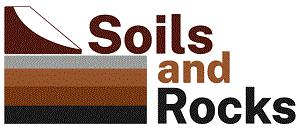Abstract
Geotechnical engineers frequently rely on semi-empirical methods like Décourt-Quaresma and Meyehof’s to estimate the bearing capacity of piles. This paper proposes alternatives to these methods, presenting an approach using machine learning models for predicting the bearing capacity of precast concrete piles. It uses data samples including 165 load tests, each one accompanied with a SPT sounding. This study proposes two types of analysis using two separated datasets, one based on the Décourt-Quaresma method and the other based on the Meyerhof method. Six machine learning algorithms of distinct biases are trained and tested with a leave-one-out cross validation procedure and the models’ predictive performance is assessed through two metrics: root mean squared error (RMSE) and coefficient of determination (R2). The best performing technique was random forest (RF) using Décourt-Quaresma dataset, with an RMSE of 642.38. All other machine learning techniques obtained a RMSE below 710, overcoming Meyerhof's and Décourt-Quaresma's semi-empirical methods, which both obtained RMSE values close to 900. This study proposes 95% and 90% confidence intervals for the best technique employing a graphical interpretation, so that geotechnical engineers can choose which level of safety they wish to work with. Finally, the study presents a case study showing that the best performing models achieve a reasonable accuracy, surpassing the semi-empirical methods in two of the three piles considered. The representativity of the new examples within the used datasets explain the accuracy of the techniques.
Keywords
Concrete precast piles; Bearing capacity; Semi-empirical methods; Machine learning

 Thumbnail
Thumbnail
 Thumbnail
Thumbnail
 Thumbnail
Thumbnail
 Thumbnail
Thumbnail
 Thumbnail
Thumbnail
 Thumbnail
Thumbnail
 Thumbnail
Thumbnail






